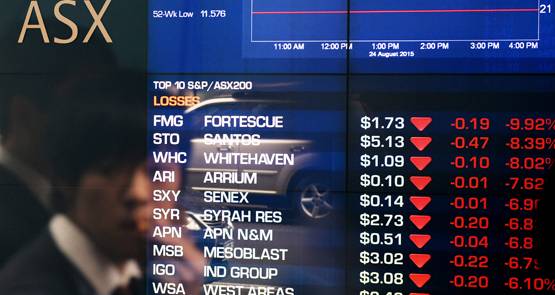
Ten years ago yesterday, the Australian sharemarket hit an all time peak: the ASX 200 reached 6851 points. At the time, the financial story was the collapse of the country’s second biggest shopping centre company, Centro. Many of us, of course, were preoccupied with the looming wipeout of the Howard government, and John Howard himself.
It was a different economy back then, and not just because the mining boom was filling Peter Costello’s coffers with revenue. Manufacturing still employed a million people; retail was the biggest employer, not health and social care. Productivity growth, strangled by John Howard’s Workchoices, was nearly non-existent. Wages grew around 4% a year; inflation had briefly dipped to 2% but it was bouncing between 4% levels that prompted the Reserve Bank to raise interest rates — most famously during the 2007 election campaign. It was a high-growth economy in which Australians chose to spend their perceived wealth — often from reducing their savings — on goods; the “experience economy” that is now hurting retail across the world and even in countries like India was still in the future.
Then the financial crisis hit and the world changed — seemingly irrevocably, in ways economists are still trying to understand.
In the following 11 months after November 2007, the sharemarket lost 54% of its value, and has never returned to that peak since. At the moment, the ASX 200 hovers under the 6000 point mark, for the second time in a year or so. But in a reflection of how the sharemarket isn’t the real economy, Australia is now substantially larger in economic terms: we’ve grown from a $1.1 trillion economy to a $1.7 trillion economy. That’s despite the global recession, despite the dollar soaring above parity in 2010 and again in 2011 and staying there for more than a year; despite the fact that every mining boom in Australian history ended in an inflationary spiral and recession until Wayne Swan and Glenn Stevens managed to land the 2011 boom safely; despite cyclones and floods smashing key sectors. Despite the slowdown in 2013 and the fact that, were it not for Joe Hockey keeping deficits running at historic levels and the Reserve Bank keeping interest rates at record lows, we would’ve sunk into recession. Despite unprecedented political instability that gave us five changes of Prime Minister and counting.
Ten years on, the sharemarket may still be below the levels of 2007, but business is enjoying a low inflation, high-profit economy with virtually no wages growth amid strong employment growth — and with interest rates at record lows. True, energy prices are a debacle responsibility for which covers generations of major party politicians from Keating onward, but they’re in the context of an ultra-low inflation environment where if it wasn’t for energy prices, the CPI would barely move. Beyond that, business has literally nothing to complain about — except, as a few more realistic figures admit, wages growth is so low it’s undermining demand.
Why has the economy prospered? A flexible exchange rate — which despite 2010-11, was invaluable in the early stages of the financial crisis, when the dollar sunk into the US50 cent range. Monetary policy led by a responsive Reserve Bank. And wage restraint by workers under a flexible industrial relations system that, as the Productivity Commission recently noted, has delivered much higher productivity growth than Workchoices.
And, of course, a world’s best practice defence against financial collapse and recession from the Rudd government and the Reserve Bank that kept Australia going while the rest of the world got hammered: a well-timed stimulus package aimed at retail and construction; loan and deposit guarantees and insurance; pumping billions in short term loans and cash into the financial system and the economy to stop runs on the banks and a credit crunch.
And most of it done under a barrage of criticism from then-opposition leader Malcolm Turnbull and the Coalition, academic and business economists who refused to acknowledge the crisis, banks that to this day play down the fact that the were kept alive by the government and the RBA. And the Liberals’ cheerleaders at News Corp and the Financial Review, which benefited, like most other businesses, from Labor’s successful efforts to protect the economy. If they’d all had their way, Australia would be a very different, and much more troubled, place.









Thank you for singing my song so beautifully. I only wish I had your voice. Unfortunate that so many commentators are tone deaf.
In a small forest in CrikeyShire a beautiful bird can tweet their song to the fortunate number who can navigate their way past the Newscorp swamp, the Fairfax pine plantation and not get drawn into the free ABC neo-progressive music festival.
“…. Australian business has little to complain about”? I like that, very droll.
….. For a start, they still have to pay their serfs.
Hockey would just love your version of his good decision was, that is running big deficits. Never worked out what caused them though, as he seemed to cut everything at the time.